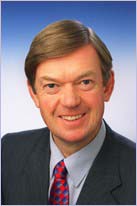The Westminster Diet and Health Forum “aims to provide the premier environment where parliamentarians, senior policy advisors, regulators and other decision makers can discuss critical issues, and exchange ideas and information with leaders from industry, responsible interest groups, analysts, academics, journalists and others”.
Their meeting on Thursday 5 July 2007 had the title “Integrating Complementary and Conventional Approaches to Health Care”. Despite some good contributions by Edzard Ernst and Simon Singh, the meeting failed to live up to the aims of the forum, partly because the representatives from the Department of Health failed to turn up (because of the changes following the accession of Gordon Brown), and partly because of the choice of speakers. For a start the audience consisted almost entirely of advocates of various forms of alternative medicine. And the meeting was chaired by David Tredinnick MP (Cons, Bosworth). This is what the BBC News profile says about him.
| David Tredinnick is an old style Conservative MP, being an Eton-educated former Guards officer, who has sat in the Commons since 1987.However, his ambition for high office was thwarted by his role in one of the sleaze stories which helped to sink the Major government.He accepted £1,000 from an undercover reporter to ask parliamentary questions about a fictitious drug.He was obliged to resign from his role as a PPS and was suspended from the Commons for 20 sitting days. He has not sat on the frontbench since.He is an orthodox Conservative loyalist, though he is more supportive of the European Union than many of his colleagues.He has, however, carved himself a niche as the Commons’ most enthusiastic supporter of complementary medicine.He has wearied successive health secretaries with his persistent advocacy of any and all homeopathic remedies.He has also supported their use in prisons and even suggested them as an aid in alleviating the foot and mouth crisis. |
The chairmanship was punctuated by party political speeches, and, more remarkably, by the apparently serious assertion that he was aware of a psychiatric hospital that doubled its staff at full moon (this is an old urban myth, and is, of course, quite untrue). His advocacy of homeopathic borax as a way to control the 2001 epidemic of foot and mouth diease can be read here.
Picture of David Tredinnick MP from the Conservative Party |
 |
Kim Lavely, chief executive of the Prince’s Foundation for Integrated Health (FIH), was chosen as the keynote speaker. She made (several times) the quite remarkable assertion that Prince’s Foundation did not advocate complementary medicine. That’s not quite the impression given by their web site, and I have to say I find the dissimulation of speeches like this hard to take. Just as with her boss, the Prince of Wales, the message seems to be tailored to the audience.Kim Lavely, and Boo Armstrong (of GetWell UK), tried to persuade me that the ‘audit’ of the effects of Pater Hain’s infliction of privatised alternative medicine in Northern Ireland would tell us something useful.Of course it won’t provide any useful information. The efforts of Ben Goldacre to explain to the public what constitutes a trial and what doesn’t have not made much progress here. Edzard Ernst’s request for an example of a treatment that could not be tested in a randomised controlled trial produced no response.
Regulation of complementary medicine is the topic that occupied much of the time. The obvious question is ‘how can one have a professional body for a therapy that doesn’t work?’. This crucial question was consistently ignored. Alternative medicine advocates are mostly desparate to gain respectability by becoming regulated professionals, though only, of course, as along as the regulations do not require them to demonstrate that they can actually benefit patients (see letter to The Times).
The Council for Healthcare Regulatory Excellence (CHRE) is yet another quango. I was unaware of its existence until their “head of Fitness to practice” gave a talk. This organisation gets over £2 million per year of taxpayer’s money. What does it do? Well “CHRE is a statutory overarching body, covering all of the United Kingdom and separate from Government, established from April 2003. It promotes best practice and consistency in the regulation of healthcare professionals by the following nine regulatory bodies”. But these bodies include not only the General Medical Council and the General Dental Council, but also the two forms of alternative medicine that have so far succeeded in getting ‘regulated’ status, the General Chiropractic Council and the General Osteopathic Council (for information on Chiropractic see below and here).
H.L. Mencken (1924) on chiropractic
“This preposterous quackery flourishes lushly in the back reaches of the Republic, and begins to conquer the less civilized folk of the big cities.” (source)
I asked the CHRE representative, Mike Andrews, what would happen if a question of fitness to practice in medicine arose that involved inappropriate use of form of alternative medicine that was also represented by CHRE, but of course I got no answer. Such cases have happened in the UK, for example Dr Marisa Viegas was suspended by the GMC advising a patient to stop heart medication which led to her death. And a Dutch doctor was struck off the register after the death of Sylvia Millecam.
The CHRE seems to be yet another expensive form of ‘box-ticking’ bureaucratic regulation that ends up doing more harm than good. We have become very familiar with such things in universities, where “quality assurance regulators” approve people like Patrick Holford, and pursue policies that end up harming good science, not helping it.


[…] This post was mentioned on Twitter by David Colquhoun and Blue Wode, Thetis. Thetis said: RT @david_colquhoun Tory astrologer David Tredinnick http://bit.ly/42CfkZ, strikes again http://bit.ly/1wID0B. Mealy-mouthed gov't response […]